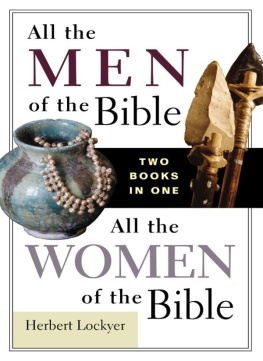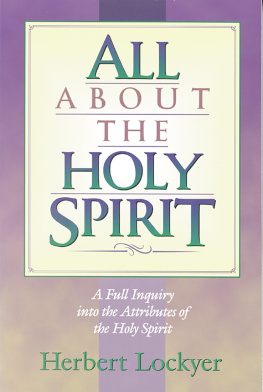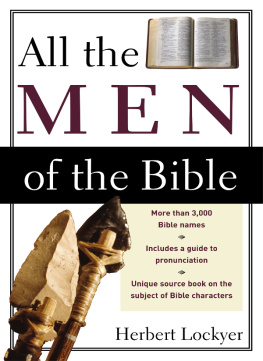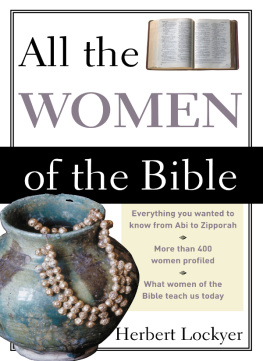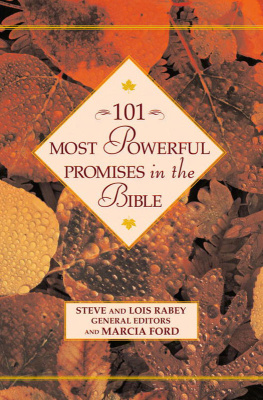Dr. Herbert Lockyer was born in London in 1886 and held pastorates in Scotland and England for twenty-five years before coming to the United States in 1935.
In 1937 he received the honorary Doctor of Divinity degree from Northwestern Evangelical Seminary.
In 1955 he returned to England where he lived for many years. He then returned to the United States where he continued to devote time to the writing ministry until his death in November of 1984.
Once an author decides to write a certain book and has settled upon its main outline, his first effort is to gather a library of authorities who have already dealt with the general aspects of his subject. Such aids to study are invaluable to a writer and act as a stimuli to thought. A perusal of the Bibliographies quoted at the end of the other books in this series All the Men of the Bible; All the Prayers of the Bible; All the Kings and Queens of the Bible; All the Miracles of the Bible will reveal the various religious and secular lakes in which the author fished.
When this present volume was decided upon, I immediately set about gathering the works of others in the field of divine promises, but I was disappointed over the paucity of printed help. Only one satisfactory volume came to light. The advice of the Secretary of the Evangelical Library in London was sought. He replied, Although clearly one of the most important of all Bible subjects, it has been sadly neglected. For this reason, there is not a big range to refer to. Secretary George Williams was good enough, however, to inform me that the classic on the subject is unquestionably that great and gracious divine, Dr. Samuel Clark. Happily, out of its countless thousands of volumes, rare and modern, The Evangelical Library had a copy of the most helpful book to loan me and what a treasure it is! The collection of verses in this volume have been recently published separately under the title of Precious Bible Promises, by Grosset and Dunlap, New York.
Scripture Promises, as Dr. Clarks study is named, was published more than 130 years ago. No wonder it is rare! What makes this old book so valuable is not only Dr. Clarks own Introduction and his classification of hundreds of promises, but a unique Introductory Essay by Dr. Ralph Wardlaw of Glasgow, written in 1831. As it is almost impossible to secure another copy of this precious small book, I have freely adopted and adapted many of the profitable remarks of Dr. Wardlaw on the promises as a whole, feeling that Twentieth Century Christians should benefit, as I have, from the observations of this learned divine, who lived more than a century and a half ago.
Grateful recognition is also given for help received in the compilation and exposition of many of the tabulated promises from devotional books made up of some of the most precious promises and the most important precepts of the Bible. Recommended are: Daily Manna, by J. Gilchrist Lawson; Guide to the Oracles, by Dr. Alfred Neven; Climbing the Heights, by Al Bryant; The Hour of Silence The Secret Place, by Dr. Alexander Smellie; Morning and Evening, also Daily Checkbook, by C. H. Spurgeon; Topical Text Book; The Continual Burnt Offering, by Dr. H. A. Ironside; The Faithful Promises, by Dr. J. R. Macduff; The Green Pastures, by Dr. J. R. Miller; The Promises of Jesus, by William J. May; Rainbow in the Cloud, by Lolo E. Kilfoil; Pathway of Promise, by J. A. M.; Give Us This Day, by Herbert Lockyer; This Is the Day, by Nell Warren Outlaw. Profitable assistance was likewise received from the Chain References in the Scofield Reference Bible. In the realm of expositional material, much use was made of Ellicotts Bible Commentary, Spurgeons Treasury of David, and Matthew Henrys indispensable work.
The question may arise as to whether this book in your hands justifies its title of dealing with all the promises found in the Bible. It has been computed that there are 30,000 Bible promises. No indication is given as to how this colossal number is reached. Altogether, there are 31,173 verses making up the Bible; 23,214 verses comprising the Old Testament, and 7,959 the New Testament. Doubtless this total of verses gave rise to the 30,000 every verse being a promise. The magazine Time, of Dec. 4,1956, carried an item to the effect that Schoolteacher Everet R. Storms, of Kitchener, Canada, reckoned the 30,000 figure to be off the mark. During his 27th reading of the Bible, this devout student tried to tally up the promises, a task which took him a year and a half. Storms came up with 7,487 promises by God to man, 2 by God the Father to God the Son, 991 by one man to another (such as the servants who promised to interpret King Nebuchadnezzars dream), 290 by man to God. 21 promises were made by angels, one by man to an angel, and two were made by an evil spirit to the Lord. Satan made nine, as when he promised the world to Christ if He would fall down and worship him. Storms then gives us the grand total of 8,810 promises.
Scattered throughout the Bible are hundreds of definite explicit promises forming the category Peter names as the exceeding great and precious promises (II Peter 1:4). But when we remember that all the prophecies and covenants are promises, and that almost every verse of the 2,461 forming the Psalms is a potential promise, as are the 915 verses making up Proverbs, then it is realized what a task confronts an author when he endeavors to set forth



